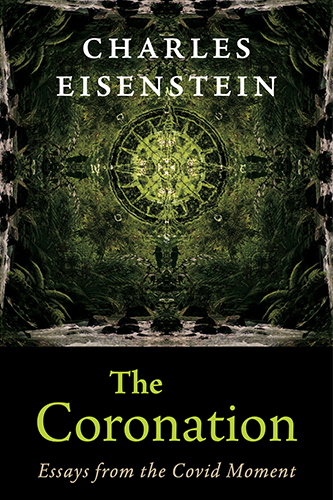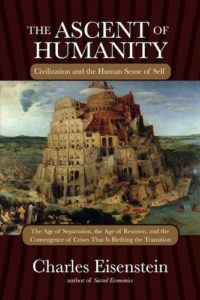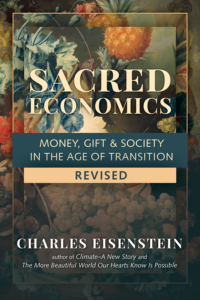Climate — A New Story
Chapters
Chapter 11: An Affair of the Heart
Reanimating Reality
The more closely we participate in the affairs of earth, sky, soil, rocks, and so on, the easier it is to see the God in all things. This is not a perception exclusive to animistic cultures. The poet David Whyte recounts a visit with a Scottish fisherman on a remote island, who lived the traditional ways. He said a prayer for every significant act of the day: a prayer for getting out of bed, a prayer for drawing the curtains, a prayer for breaking bread, a prayer for getting into his boat, a prayer for casting the net. His was a world thick with being. Something is always watching, always listening. He was never alone, because the whole world was alive.
The reanimation of our world is crucial to ecological healing. If we live in the perception that the world is dead, we will inevitably kill what is alive.
How does reanimation happen? You might hold highly developed philosophies of nondual spirituality, animism, pantheism, or panentheism, but act automatically from the old story when push comes to shove. Our entire cultural conditioning militates against the deep trust that comes from knowing that God sees everything, from knowing that all beings are alive and listening, from knowing that every action has cosmic significance. To mentally embrace a new story is a first step, but alone it is insufficient to undo generations of cultural programming.
Go ahead and try talking to a tree or a pond. If you are like me, a voice in your head will hector you: “It isn’t really listening. It can’t understand you. You are being silly.” And even if it seems like the tree is talking back to you, do you wonder if maybe it is just your imagination? Normally, people need some help to inhabit the Story of Interbeing deeply enough to consistently act on it.
The help comes in the form of a direct experience. We can’t force the other beings of this world to reveal themselves in their beingness, but we can ask them. The way to ask is to give attention to your longing: your longing to rejoin the living universe, to be companioned.
I will give an example of such help that I received a couple years ago, when I visited Taiwan on my way to hold a retreat in Indonesia. I used to live in Taiwan, and I think a piece of my heart is still there. My old friend Philip picked me up from my 5 a.m. flight and we drove straight into the mountains, nearly an hour on narrow, winding roads, to a spot where he’d heard there was a sacred grove of trees. We parked in a lot near the trailhead and hiked up a steep, narrow trail that required the use of ropes in some places. But after a couple hours of hiking, we still hadn’t found the grove, and we needed to turn back soon because we were tired and I was supposed to speak at 3 p.m. in Taipei. When we came to a nasty muddy uphill section, we considered turning around.
“Let’s go a little further,” I suggested, “up this hill. Maybe we’ll be able to see it from there.” We got past the muddy section and there wasn’t a view there, just another rise, but then we saw a little sign that said, “Come on! The sacred grove is only 5 minutes away!”
It was as if the sign were written just for us.
Soon we arrived at the grove. The trees were incredible. Two-thousand-year-old massive trees, trunks fifteen feet or more in diameter, with ancient branches thicker than I am tall, covered with ferns and other plants, each a whole ecosystem unto itself. It was impossible to look at them without a nearly overwhelming feeling of being in the presence of a divine being. We were awestruck. Neither of us spoke for quite some time.
I thought about how the whole forest used to consist of trees like these. They’d all been cut down except these seven or eight grandfathers, spread over maybe an acre of woods. I wondered if the trees were angry that humans had cut down all their companions. “Do you think the trees are mad at us?” I asked Philip.
He knew exactly what I meant and took the question seriously. After a while he said, “No. They are happy that we are here.” His words rang with truth.
Later I understood why the trees were happy. They were happy that I had even asked the question and that Philip had taken it seriously. Because that question came from a place of actually seeing the trees as real beings that could be angry or sad, instead of seeing them the way the timber companies had seen them, as the mere stuff of profit, or as most hikers saw them, as mere spectacles to photograph. Dear reader, have you ever had the experience of finally being seen for who you are? Women and black people especially know what it is to be seen as less than a full being, but even my fellow white straight males know what it is to be a mark, a sales target. So I think the trees were happy that we humans were rejoining them in the community of all being.
As we descended the trail back to the car, something odd happened—a subtle shift in reality, as if we had entered into a dream world where everything took on a symbolic resonance. A troupe of monkeys visited us, swinging directly over our heads. When we got to the parking lot Philip said, “I’m a little worried about the keys. They don’t seem to be in my pocket.”
We looked everywhere in his backpack and on the ground. Finally I looked in the car and there they were, stark and taunting on the front seat. The car was locked and the windows were up. It was like a dream: “The key to the vehicle is locked in the vehicle itself.” I suppose there must be a spiritual teaching there.
My friend got anxious, and the more anxious he got the more relaxed I became, wondering what adventure the universe (or the trees) had arranged for us. I was certain we would somehow make it on time, without being concerned at all whether we would. Everything felt perfect.
This was a remote spot—the nearest village was twenty minutes (driving) away. Philip got out his cellphone to call someone to come get us. Of course the battery was dead. There was a little house nearby and we asked the guy there if he had any tools to break into the car. No. How about a garage or locksmith? He let us use his phone but didn’t have the number of anything useful except the nearest police station. I called them and they said they’d send someone.
An hour later a police car came. The police were businesslike and gruff at first, but only because they were embarrassed that they had no clue how to get into the car either. They called a garage but when they were told the price, they were indignant on our behalf and told the garage not to send anyone. So there we were, four dudes without a clue, shuffling our feet. Finally one of them said, “You’re just gonna have to break a window.”
This is like a dream, remember? So how many blows with a rock did it take to overcome my inhibitions and break the window? Three blows. And a little shard of glass flew out and drew a single drop of blood from my finger.
Trying not to be late, we were driving really fast but suddenly a fruit stand called out to us and it turned out to be selling native varieties of apples and tangerines, little Taiwanese ones less than two inches in diameter, organic, and amazingly flavorful, as if all the flavor of a big one were packed into each. Everything was perfect. I shared my sentiment with Philip, who, facing the prospect of returning the car to the friend he’d borrowed it from, was understandably less enthusiastic about our day so far, although touched by the magic of the trees as much as I was. Wryly he asked me, “Is there anything else I can do to make the day even more fulfilling for you?”
“Well,” I said half-jokingly, “you know those ‘earth guavas’?” (These are tiny guavas that grow in Taiwan and are almost never sold commercially.) “I’d sure like some of those.”
“I don’t know if I can help you there.”
We showed up to the venue exactly on time and I gave my speech splattered with mud. Just before I began, an old friend whom I hadn’t seen in twenty years came up and gave me a bag. “I thought you might like these,” he said. In it were boiled peanuts, lingjiao, and, you guessed it, earth guavas.
It was like the island of Taiwan was saying, “You don’t believe me that I love you? Well, here are some earth guavas just to make sure.”
Of course it could all be coincidence, but it seemed like the trees gave me that gift, using my friend as their instrument. “Dang,” I joked to myself, “if I’d known any wish would be fulfilled, maybe I would have asked for more than guavas.”
I offer you this story to suggest that when we enter the world-story in which all beings are sentient, the world comes alive with them. We begin to experience synchronicities that confirm the universe is intelligent. Or is it that we are just noticing them more? The mind of separation wants proof to precede belief, but I find it is often the other way around. Thus we face a choice. Which world shall we live in? It echoes the choice posed in chapter 7: a concrete planet, or a planet profuse with life? A beautiful world or an ugly world? A living world or a dead world?
If we want a living world, we have to act from the place where the world is alive.






